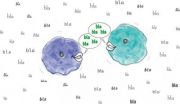(Press-News.org) New research from the University of Copenhagen and Copenhagen University Hospital shows that low levels of vitamin D are associated with a markedly higher risk of heart attack and early death. The study involved more than 10,000 Danes and has been published in the well-reputed American journal Arteriosclerosis, Thrombosis and Vascular Biology.
Vitamin D deficiency has traditionally been linked with poor bone health. However, the results from several population studies indicate that a low level of this important vitamin may also be linked to a higher risk of ischemic heart disease, a designation that covers heart attack, coronary arteriosclerosis and angina. Other studies show that vitamin D deficiency may increase blood pressure, and it is well known that high blood pressure increases the risk of heart attack.
"We have now examined the association between a low level of vitamin D and ischemic heart disease and death in the largest study to date. We observed that low levels of vitamin D compared to optimal levels are linked to 40% higher risk of ischemic heart disease, 64% higher risk of heart attack, 57% higher risk of early death, and to no less than 81% higher risk of death from heart disease," says Dr. Peter Brøndum-Jacobsen, Clinical Biochemical Department, Copenhagen University Hospital.
The scientists have compared the 5% lowest levels of vitamin D (less than 15 nanomol vitamin per litre serum) with the 50% highest levels (more than 50 nanomol vitamin per litre serum). In Denmark, it is currently recommended to have a vitamin D status of at least 50 nanomol vitamin per litre serum.
The higher risks are visible, even after adjustment for several factors that can influence the level of vitamin D and the risk of disease and death. This is one of the methods scientists use to avoid bias.
Blood samples from more than 10,000 Danes
The population study that forms the basis for this scientific investigation is the Copenhagen City Heart Study, where levels of vitamin D were measured in blood samples from 1981-1983. Participants were then followed in the nationwide Danish registries up to the present.
"With this type of population study, we are unable to say anything definitive about a possible causal relationship. But we can ascertain that there is a strong statistical correlation between a low level of vitamin D and high risk of heart disease and early death. The explanation may be that a low level of vitamin D directly leads to heart disease and death. However, it is also possible that vitamin deficiency is a marker for poor health generally," says Børge Nordestgaard, clinical professor at the Faculty of Health and Medical Sciences, University of Copenhagen and senior physician at Copenhagen University Hospital.
Long-term goal is prevention
The scientists are now working to determine whether the connection between a low level of vitamin D and the risk of heart disease is a genuine causal relationship.
If this is the case, it will potentially have a massive influence on the health of the world population. Heart disease is the most common cause of adult death in the world according to the World Health Organization (WHO), which estimates that at least 17 million people die every year from heart disease.
"The cheapest and easiest way to get enough vitamin D is to let the sun shine on your skin at regular intervals. There is plenty of evidence that sunshine is good, but it is also important to avoid getting sunburned, which increases the risk of skin cancer. Diet with a good supply of vitamin D is also good, but it has not been proven that vitamin D as a dietary supplement prevents heart disease and death," says Børge Nordestgaard.
###Contact:
Professor Børge Nordestgaard
Faculty of Health and Medical Sciences
Copehagen University Hospital
Mobile: +45 30 28 72 63
Mail: Boerge.Nordestgaard@regionh.dk
Communications officer
Stine Rasmussen
Faculty of Health and Medical Sciences
Mobile: +45 24 34 03 22
Mail: stine.rasmussen@sund.ku.dk
Vitamin D deficiency increases risk of heart disease
2012-09-24
ELSE PRESS RELEASES FROM THIS DATE:
Climate is changing the Great Barrier Reef
2012-09-24
Satellite measurement of sea surface temperatures has yielded clear evidence of major changes taking place in the waters of Australia's Great Barrier Reef over the past 25 years, marine scientists have found.
The changes have big implications for the future management of the GBR and its marine protected areas say Dr Natalie Ban and Professor Bob Pressey of the ARC Centre of Excellence for Coral Reef Studies and James Cook University, who led the study with Dr Scarla Weeks from the University of Queensland.
"When we looked back at satellite data collected since 1985, ...
World Heart Federation says heart health starts earlier than you think
2012-09-24
A new multi-national survey reveals the extent of misconceptions about when is the right time to start taking action to prevent cardiovascular disease (CVD). In a four-country survey sample of 4,000 adults, 49 per cent answered age 30 years or older when asked at what age they believe people should start to take action about their heart health to prevent conditions such as heart disease and stroke. The fact is that CVD can affect people of all ages and population groups, and the risk begins early in life through unhealthy diets, lack of physical activity and exposure to ...
Cellular eavesdropping made easy
2012-09-24
It is much harder to keep up with a conversation in a crowded bar than in a quiet little café, but scientists wishing to eavesdrop on cells can now do so over the laboratory equivalent of a noisy room. A new method devised by scientists at the European Molecular Biology Laboratory (EMBL) in collaboration with the German Cancer Research Centre (DKFZ), both in Heidelberg, Germany, provides a new approach for studying the proteins cells release to communicate with each other, react to changes, or even to help them move. Published online today in Nature Biotechnology, the work ...
New IVF breakthrough
2012-09-24
Researchers at the University of Gothenburg have discovered that a chemical can trigger the maturation of small eggs to healthy, mature eggs, a process that could give more women the chance of successful IVF treatment in the future. The results have been published in the revered journal PloS ONE.
Women and girls treated for cancer with radiotherapy and chemotherapy are often unable to have children as their eggs die as a result of the treatment.
Although it is now possible to freeze eggs and even embryos, this is not an option for girls who have yet to reach puberty. ...
Immune system molecule affects our weight
2012-09-24
Researchers at the Sahlgrenska Academy, University of Gothenburg, Sweden, have identified a molecule in the immune system that could affect hunger and satiety. The researchers hope that new treatments for obesity will benefit from this finding.
Interleukin-6 is a chemical messenger in our immune system that plays an important role in fighting off infection. However, recent research has, surprisingly, shown that it can also trigger weight loss. Researchers at Sahlgrenska Academy, University of Gothenburg, have been investigating and managed to identify the specific types ...
New back pain gene identified in largest genetic study of its kind
2012-09-24
Researchers at King's College London have for the first time identified a gene linked to age-related degeneration of the intervertebral discs in the spine, a common cause of lower back pain.
Costing the UK an estimated £7billion a year due to sickness leave and treatment costs, the causes of back pain are not yet fully understood. Until now, the genetic cause of lower back pain associated with lumbar disc degeneration (LDD) was unknown, but the largest study to date, published this week in the journal Annals of Rheumatic Diseases, has revealed an association with the ...
Red king or red queen
2012-09-24
This press release is available in German.
The relationship between species determines how rapidly they evolve. Parasites and their hosts coevolve more rapidly, and partners in a mutualistic relationship can evolve more slowly. But this view is obviously too simplistic. The rate of evolution in a mutualistic relationship does not depend only on the type of interactions, but also on the number of individuals involved, according to a model developed by researchers of the Max Planck Institute for Evolutionary Biology in Plön, Germany. Therefore, while partners can benefit ...
Two-thirds of the world's new solar panels were installed in Europe in 2011
2012-09-24
Europe accounted for two thirds of the world-wide newly installed photovoltaic (PV) capacity in 2011, with 18.5 GW. Its overall PV capacity totalled 52 GW. The yearly electricity produced by PV could power a country with the electricity demand of Austria, which corresponds to 2% of the EU's electricity needs. These are some of the highlights of the 2012 Photovoltaics Status Report published today by the European Commission's Joint Research Centre.
The study summarises and evaluates the current activities regarding manufacturing, policies and market implementation world-wide. ...
Glacial youth therapy for the Scandinavian landscape
2012-09-24
The high elevation flat surfaces characteristic of the Norwegian landscape are in geologically terms young, according to a paper in Nature Geoscience.
In a paper recently published in Nature Geoscience, researchers from the University of Bergen (UiB) and ETH Zurich have demonstrated that ice sheets have extensively shaped the fjords of Norway for the last 2.8 million years.
– However, the massive sediment record deposited offshore Norway during this period tells us a more complex story, explains Postdoctoral Fellow Philippe Steer at UiB's Department of Earth Science ...
Fueling the fleet, Navy looks to the seas
2012-09-24
WASHINGTON--Refueling U.S. Navy vessels, at sea and underway, is a costly endeavor in terms of logistics, time, fiscal constraints and threats to national security and sailors at sea.
In Fiscal Year 2011, the U.S. Navy Military Sea Lift Command, the primary supplier of fuel and oil to the U.S. Navy fleet, delivered nearly 600 million gallons of fuel to Navy vessels underway, operating 15 fleet replenishment oilers around the globe.
From Seawater to CO2
Scientists at the U.S. Naval Research Laboratory are developing a process to extract carbon dioxide (CO2) and produce ...

